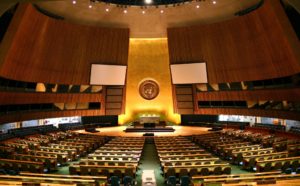India abstains from voting on nuclear weapons ban at the UN
In an assembly at the UN where member states expressed desires to start talks regarding the possibility of a ban on nuclear weapons, India abstained from voting.
Member states of the UN voted in majority on Thursday to start negotiations on a treaty to ban the manufacture, possession, stockpiling and use of nuclear weapons, after a United Nations General Assembly committee proposed to begin talks about the same. 123 nations voted in favour of the resolution, while 38 opposed it and 16 abstained from voting, one of which was India.
The UN just voted to negotiate a ban on nuclear weapons in 2017! 123 in favour, 38 against, 16 abstentions. #FirstCommittee #GoodbyeNukes pic.twitter.com/4iBTrjrYAM
— ICAN (@nuclearban) October 27, 2016
The resolution was a result of an initiative led by states such as Mexico, Austria, Ireland, Brazil, Nigeria and South Africa. The initial initiative saw support from groups worldwide. “This is a historic breakthrough in global efforts to rid the world of nuclear weapons. A treaty banning nuclear weapons will be of enormous importance in establishing a clear, legal rejection of these weapons by the majority of the international community – even without the support from the nuclear-armed states,” said Beatrice Fihn, executive director of International Campaign to Abolish Nuclear Weapons (ICAN). ICAN is a campaign, with a global presence, working to establish and support negotiations for a treaty banning nuclear weapons, by means of various initiatives.
The resolution, currently as passed, is legally non-binding but it seeks negotiations to be in place by next year to initiate and shape the new treaty that would ban nuclear weapons, citing deep concern over the “catastrophic humanitarian consequences of any use of nuclear weapons.” Eventually it aims to establish “a legally binding instrument to prohibit nuclear weapons, leading towards their total elimination.” With a full-measure vote to take place in November this year, Fihn remains hopeful. “This treaty won’t eliminate nuclear weapons overnight. But it will establish a powerful, new international legal standard, stigmatizing nuclear weapons and compelling nations to take urgent action on disarmament,” she stated. Countries, international organizations and civil society are set to participate in the conference, to be held in New York next year, over three sessions.
Opposition remains
Nuclear weapons are said to be the only weapons of mass destruction that have not been banned by international treaty obligations. However, four of the five UN Security Council member states, namely the Great Britain, France, Russia and the United States, joined 34 other countries in voting against the motion of starting talks about the potential for a ban on these weapons. States asserted that a discussion within the provisions of the Nuclear Non-Proliferation Treaty (NPT) would yield a stronger result. In strong opposition, special representative of the US, Robert Wood said, “How can a state that relies on nuclear weapons for its security possibly join a negotiation meant to stigmatize and eliminate them?” As he asserted that nuclear weapons play a role in maintaining peace and stability in some parts of the world, he added that a ban treaty runs the risk of undermining regional security.
With tensions mounting between India and Pakistan, concerns with North Korea’s declaration of nuclear prowess and increasing assertiveness in Chinese foreign policy, many of the Asian states with nuclear capabilities chose to abstain from voting. North Korea, in a surprise, voted for the motion, expressing interest in favour of the proposed treaty. India abstained from voting, as did China and Pakistan. These are countries who are believed to have nuclear arms programs that are evolving, and with regional relations growing more complex, it remains to be seen if future negotiations for ban of nuclear weapons will see positive participation from these countries.










